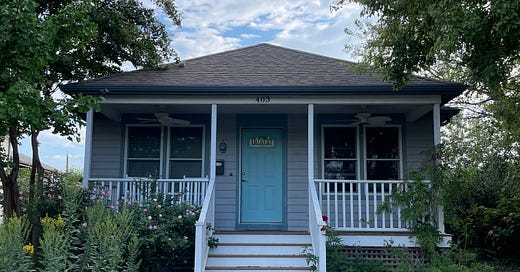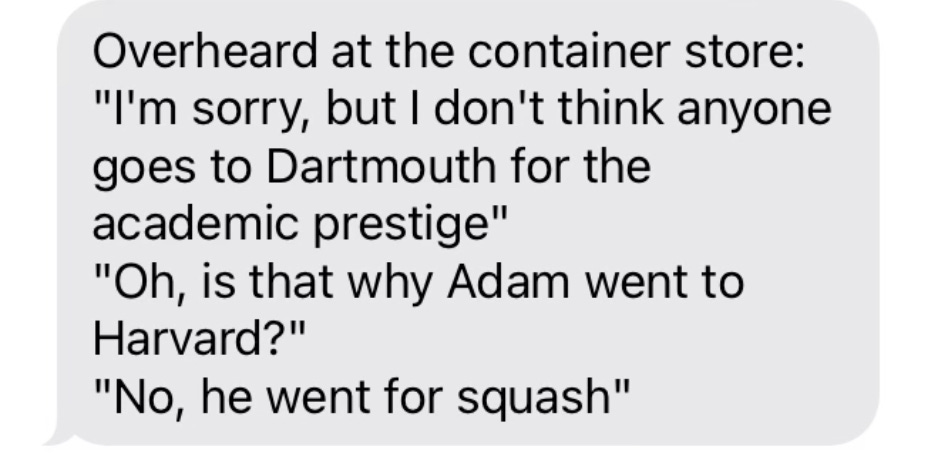1.
The house has only one bedroom, albeit a spacious one, with an oak dresser, abundant closet space, and the sort of wooden trunk that’s always struck me as vaguely nautical. On weekends it accommodates an air mattress for my son. The actual bed, while clearly intended to be a queen, is somehow incrementally larger; the sheets don’t fit properly, and there’s a tear in the bottom-left corner of the fitted one. This would bother me more if it wasn’t so in line with the entire patina: spare, shabby, authentically (as opposed to hiply) retro. I write at the dining table because the desk is so small. The appliances are mismatched; the bottom cabinetry sky blue. It is nowhere near as nice as our townhouse in Washington. It is the most glamorous place I have ever lived.
The glamour is two-fold. Firstly, of incremental solitude, which is to say, of control, but sans the loneliness that is control’s customary sacrifice. That I might theoretically tidy up any time according to my own whim relieves any inclination or urgency to actually do so, to concern myself with the material world at all. In my monastic weekday isolation, I am utterly at peace with my disorder, with my sloth, my dirty hair. My physical presence—the fact I even have a body—practically disappears for hours at a time, an adjacent feeling to that of being utterly absorbed in a finished book. I’m reminded writing is not properly a separate activity from but a direct extension of reading, the reading of new text. There are few greater luxuries in my mind.
The second glamour is of imagination. Specifically, as the first heroine of my heart would put it, scope for imagination. She uses this phrase numerous times in the sacred text, but foremost in my memory is during Anne and Diana’s seminal visit to Charlottetown:
“Isn’t it just like a palace?” whispered Diana. “I never was in Aunt Josephine’s house before, and I’d no idea it was so grand. I just wish Julia Bell could see this—she puts on such airs about her mother’s parlor.”
“Velvet carpet,” sighed Anne luxuriously, “and silk curtains! I’ve dreamed of such things, Diana. But do you know I don’t believe I feel very comfortable with them after all. There are so many things in this room and all so splendid that there is no scope for imagination.”
Anne goes on to enjoy their opulent trip immensely, even if her favorite part is relaying its splendor—describing it—back at Green Gables.
“Miss Barry put us in the spare room, according to promise. It was an elegant room, Marilla, but somehow sleeping in a spare room isn’t what I used to think it was. That’s the worst of growing up, and I’m beginning to realize it. The things you wanted so much when you were a child don’t seem half so wonderful to you when you get them.”
How funny, I thought, that Anne’s desire manifests in the idea of a spare room, her usage connoting not simplicity but excess. I hadn’t precisely remembered this last line either, even as its sentiment, which I’ve adultly associated more with George Eliot and Wharton and James, obviously implanted itself in the deepest recesses of my being far earlier. (And wow, even the great children’s novels reveal the imitative nature of desire, amirite?) But I thought of this scene in the abstract over and over as I metaphysically explored my new book’s architectural decadence from my little spare shack with greater enjoyment than the opulent properties could ever provide.
Not that I don’t thoroughly enjoy a physical palace, too! But ultra-luxurious experiences are not ideal for writing. They demand too much to be lived. It’s taken me a long while to realize this, that I do my best work in comfortable, but not necessarily exquisite environments—environments where I can fully channel my various pretensions directly into my art.
2.
The town was founded in 1631 and there’s a touch of Colonial Williamsburg to it, albeit with far less figurative and literal militancy. It is not uncommon to pass someone in period dress on a random weekday afternoon, but historical accuracy here is channeled more into architectural charm and, like, alcoholic beverages—all enforced with enough laxity as to avoid kitsch and preciousness alike.
Plus: it’s small. Not quite a “one street town,” but a two or three street one. And yet it has basically everything I need. A market and a pharmacy; an ice cream parlor, a candy store. A smattering of casual dining options, and three more upscale restaurants in a neat Victorian row. I’ve only been to one of these—Raas—though I’ve been twice, with the author Elizabeth Winkler (of heretical fame), and again with my sister-and-law and her family. In both instances it was convenient (think standardized online reservations), the food better than good enough.
3.
I mostly eat turkey sandwiches and lemon-pepper pasta and pints of mint chip Häagen-Dazs at the house, but satisfy the occasional weekday urge to be among my fellow creatures at the beach mainstay Striper Bites. Its tables are generally filled with tourists, but the bar, where I prefer to sit and read and eat passable uramaki, leans local. On occasion, I’ve offered to switch seats with uncoordinated groups of old friends talking across me.
I’m next to another quiet woman sometime in July, also reading a book—no, not mine, one of Colleen Hoover’s—but whatever, she’s a secondary character here. I think I myself was reading My Last Innocent Year, but it’s possible I’ve memorially fudged the timeline because it would be so tempting to call this my last innocent meal.
Colleen Hoover got up to leave, and a man in his twenties immediately swooped in to claim the rare vacancy at the bar before its tender had a chance to clear. Three pieces of sushi remained on her plate.
—Would it be super tacky for me to eat these? The man asked not precisely me, but me and his female companion to his other side, who I am inclined to think, perhaps too generously, had to have been a friend and not a lover.
Uh, yes, I wanted to answer, my bottom jaw unhinged, but he’d already popped one into his mouth. This was shortly followed by another before the plate was taken away.
—Well, two out of three, he said with a shrug.
Oh my god, I texted my most depraved group chat, the one that recently celebrated its ten-year anniversary and is a significant enough presence in my life to have made the acknowledgments for The Portrait of a Mirror.
Honestly? That’s savage, but you kind of have to admire it, someone texted back, or something to this effect anyway. But I could not handle this level of chaotic-evil etiquette, so I paid the bill and got the fuck out of there.
4.
The beach is a production in every way, because my son is four. He’s beyond excited and still learning to swim and literally the fairest one of all . . . and so his overall vibe is basically—sorry, I can’t resist—pale fire.
5.
The penultimate drive home to Rilla (as our DC townhouse is known, in honor of Anne’s youngest, most beautiful daughter) had a bittersweet, last-day-of-camp affect. The weather was moody, and the car full. I was headed back to (remote) work in a few days.
The car’s full again today—stuffed, really, between the beach stuff and disassembled bicycle—but it’s going to be nearly a hundred degrees, and this time, I’m feeling as ready as Anne:
“I’ve had a splendid time,” she concluded happily, “and I feel that it marks an epoch in my life. But the best of it all was the coming home.”
Happy Labor Day,
ANJ
Links & logistics:
We did a seasonal rental (Memorial to Labor Day), but have previously stayed at The Inn at Canal Square
Raas and Striper Bites are both on Savannah Road in town
Savannah Beach at the end of the same road is phenomenal for kids, but parking can be a nightmare if you arrive after 10am on peak days
My Last Innocent Year by Daisy Alpert Florin is excellent, and with its academic setting (based on Dartmouth I believe) really more autumnal than summery
RyukTV is not accepting new members, but general to the topic re: Dartmouth, this was recently shared there to my attention specifically:
How’s that for a fresh spin on decorative gourd season, motherfuckers?






sorry, I just can't seem to forget. it stayed with me. like I'm this little thingamagic, tiny pillow for sewing needles, or something. And another one goes in.
"pale fire"
Yes, I was amazed myself and could not believe I achieved that.
But it worked after reading an article -- you never know what good ideas are out there for you to experiment. with - a lot are dead ends of course, but that should not stop you from keep searching.
It is neuroscience based on understanding how parts of the brain works.
The technique is about having all the material on your desk for you to see ( not laptop with many file tabs open, as they are hidden from your sight and your imagination can't latch onto). Spread out , your note taking, assorted relevant material hand before, now just free associate connect the dots.
But first gag your internal (friendly LOL ) critic , scan all the material and say : I can use this and this, and think in scenes with a logical connections. Then Abracadabra, you will have 10 to 15 scenes in no time that are connected ;dovetailed and when expanded you will have written 5000 words in a few hours.
Rinse and repeat, I am now at the new note taking stage and gathering of new materials hence my out to lunch sign. Then I will write rapidly when I am happy with new material collection spread on my table.
This is my process now.
I bet you they don't teach that at MFA's or residencies.
Go for it NJ, a novel by Christmas.